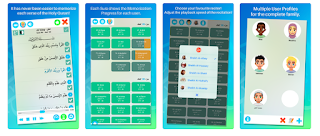It's the first day of Rmadan!
Elhamdulilah that Allah has given us this great opportunity for doing good and getting multiplied thawab for it.
Here are some ideas for Ramadan activities that you can do as a family!
1. Quran and Ramadan Did You Knows!
It’s important to let your children know the importance of the Quran and the relationship it shares with the Quran:
Did you know:
- The Quran descended from Allah to the Prophet Muhammad SAWS during the month of Ramadan
- The order/prescription of Fasting Ramadan came from the Quran (Surah al-Baqarah: 183-185)
- There is an entire surah dedicated to the MOST important night in Ramadan – which is it? Surat Al Qadr.
- The Angel Gibrael used to revise the Quran with Prophet Muhammad SAWS every Ramadan as per the hadeeth:
Abu Huraira reported: The Prophet, peace and blessings be upon him, would review the Quran once every year in Ramadan and he reviewed it twice in the year he passed away. The Prophet would seek spiritual retreat in the mosque for ten days every year and he secluded himself for twenty days in the year he passed away. Ṣaḥīḥ al-Bukhārī 4712
2. Make a Thikr chart
Outline 3 to 5 thikrs (or more if you can) for the children to repeat every day at a regular time – consistency is key. Teach kids to work smarter with thikr. Read this post here:
3. Make a good manners reward scheme
As fasting is not only abstaining from food and water, but it is also ensuring that our tongues fast from bad words and that our actions are good and pure. Create a reward chart where points can be gained – points translate in to rewards and that can each family can determine its own rewards.
Manners to add to your chart:
- Being honest
- Being generous or kind to siblings
- Complete a chore or job without being asked
- Give a compliment to someone
- Reminding the family to pray
4. Make a gratitude collage
I love this one! If you're feeling crafty, make a gratitude collage with your children. Grab some crayons, paper, glue, photos and magazine cut outs and have your children arrange items on a piece of paper. Talk about what items they chose and why they are grateful for them.
Another fun idea is to give your children a camera and have them take photos of everything they are thankful for. You can post the images in an online photo album or even create a gratitude photo book using their shots!
5. Make a charity box reminder!
Following on from the gratitude activity, getting children to understand that charity is so important and how it is even more important in Ramadan is ideal. Making a charity box with the children where you put 10 to 20 (or 30 if you’re brave) charity ideas and make sure you pick one and do it every day of Ramadan. Some charity ideas:
- Feed people in Ramadan
- Donate clothes
- Smile to everyone you see
- Sponsor a child or donate to an orphanage
- Charity through water
- Do something for an elderly person/neighbor
- Partake in building a mosque
- Teach a friend or family member younger than you something about Islam
Let me know what other great ideas do you do as a family in Ramadan!






















